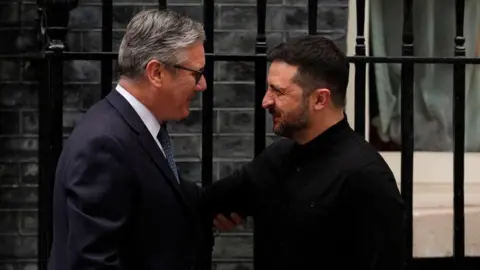## Starmer’s Coordination with European Allies Ahead of Zelensky’s Visit to the White House
In a significant diplomatic move, Prime Minister Sir Keir Starmer is convening a video call with European allies on Sunday, aligning efforts ahead of a crucial visit by Ukrainian President Volodymyr Zelensky to the White House next week. The decision underscores the growing urgency to address the ongoing conflict in Ukraine, particularly after recent political engagements involving key global leaders.
### European Leaders Unite in Support
The video call will see participation from notable figures such as French President Emmanuel Macron and German Chancellor Friedrich Merz, who will collaborate with Sir Keir in what has been dubbed the “coalition of the willing.” This initiative comes in the wake of a summit in Alaska, where former U.S. President Donald Trump and Russian President Vladimir Putin were unable to forge a ceasefire agreement, heightening concerns about the conflict’s escalation.
Starmer’s comments on Saturday highlighted his appreciation for Trump’s recent assertions that peace in Ukraine could be “closer than ever.” However, the British Prime Minister emphasized the necessity of including Zelensky in any discussions regarding the potential for peace, echoing views that the path to resolution cannot overlook Ukraine’s participation.
### Shift in U.S. Stance
President Trump, ahead of Zelensky’s visit, articulated a willingness to bypass a direct ceasefire, advocating for an immediate transition to a permanent peace deal. This marked shift in tone indicates a potential pivot in U.S. foreign policy concerning the Russia-Ukraine conflict. Zelensky responded by asserting that Russia’s reluctance to agree to a ceasefire complicates efforts towards a diplomatic resolution, signaling continued challenges ahead.
The upcoming visit to Washington D.C. is intended to provide a platform for Zelensky to engage directly with U.S. officials, as Trump plans to encourage the Ukrainian leader to consider peace negotiations with Russia. Such dialogues are crucial for the evolving geopolitical landscape, especially following the recent disruptions caused by the Anchorage summit.
### Sir Keir Starmer’s Diplomatic Engagement
In the aftermath of the summit, Sir Keir engaged with Western allies, reaffirming the UK’s commitment to provide substantial security guarantees to Ukraine as part of a potential peace deal. He commended Trump’s leadership efforts, stating, “His leadership in pursuit of an end to the killing should be commended.” The Prime Minister’s remarks reflected a concerted push to gather international consensus around the strategies for addressing the ongoing conflict.
With the grim backdrop of continuous Russian aggression, Starmer firmly reiterated that until President Putin ceases his “barbaric assault,” allied nations would exert further pressures through enhanced sanctions on Russia to curtail its military capabilities. This proactive stance signifies the UK’s active role in shaping a unified European response to the conflict in Ukraine.
### Zelensky’s Call for Inclusion in Peace Talks
Following a communication with Trump, Zelensky vocalized a desire for a lasting peace, emphasizing the importance of substantive dialogue that involves Ukraine in future discussions. His insistence on Ukraine’s integral role in negotiations reflects deep-seated concerns regarding the legitimacy and efficacy of any agreements reached without Ukrainian representation.
The Ukrainian leader also expressed fears of increased military operations from Russia, aimed at creating favorable conditions for Russia’s own narrative in upcoming discussions with international stakeholders. This situation underlines the importance of timely and strategic decision-making among allies to secure a negotiated settlement that favors peace and stability in the region.
### Conclusion
As Zelensky prepares for his visit to the United States, the interplay among European leaders and the U.S. presents a critical juncture for diplomatic efforts aimed at concluding hostilities in Ukraine. The collaborative framework established by Starmer, Macron, and Merz reflects a renewed commitment to supporting Ukraine, amidst a backdrop of fluctuating global political sentiments and urgent security considerations. The coming days will be pivotal, not only for Ukraine’s future but also for the dynamics of international diplomacy concerning Eastern Europe.












